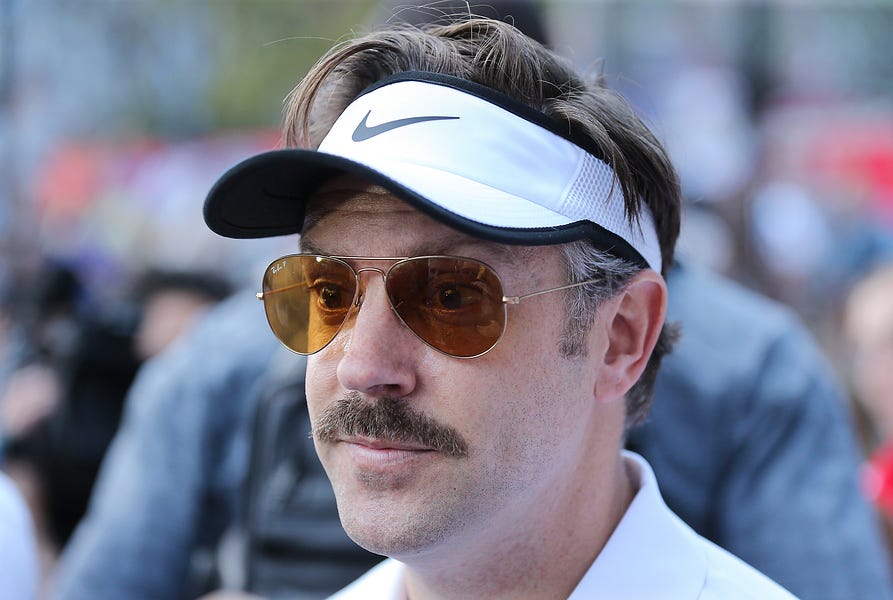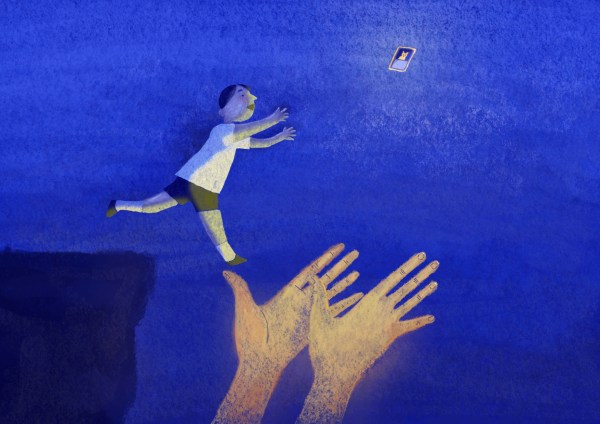Today’s newsletter is going to be different. Even though we’re on the cusp of another battle over the election and perhaps another Christian-nationalist Jericho March, let’s leave religion and politics behind. Every now and then, we all need a break. Instead, let’s talk about how a fictional soccer coach gave America a glimpse of the upside-down kingdom of God.
I’m going to put on my old youth pastor cap and combine religion and entertainment. For those that don’t know, early in my married life, I spent a crazy but wonderful year as the interim leader of a youth group at an Assemblies of God church in Georgetown, Kentucky. The previous pastor departed suddenly, and the search for his replacement took a long, long time.
I was a law firm litigator by day and a youth pastor by night. I preached, I taught Sunday School, I spent time in kids’ homes, and I fought courageously in countless paintball battles that spread across the length and breadth of Scott County. More than once, I limped into my law firm exhausted, covered in paintball bruises and worried about how to connect with 100 teenagers during the next Wednesday night youth service.
In that context, a pop culture moment that intersected with biblical truth was like manna from heaven. “Wait, there’s a song lyric (or movie scene) that the kids recognize and reflects a key spiritual reality? I can work with that!” Yes, yes, I know it can be overdone. I’ve heard perhaps one too many talks based on the legendary dinner prayer scene during Talladega Nights—we get it, don’t remake Jesus in your preferred image—but the stories we read and watch for fun often do reflect aspects of the ultimate story of creation, redemption, and salvation.
(For example, the zombie rom-com Warm Bodies is one of the best—unintentional?—Christian metaphors I have ever seen. Trust me on this.)
And that brings me to the Apple TV dramedy Ted Lasso, why it briefly took the internet by storm, and how it reflects and models profound redemptive values—values that directly contradict our present toxic moment.
It’s not giving away much to say that the conceit of the show is basically an updated and revised version of the 1989 movie Major League. It’s set in the English Premier League rather than in Major League Baseball, and the owner, Rebecca Welton (Hannah Waddingham), is trying to ruin the team as an act of vengeance against her estranged husband (who left her for a younger woman) rather than to engineer a franchise move. And how does the new owner try to ruin the team? She hires an American football coach, Ted Lasso (Jason Sudeikis), to coach an elite English soccer team. Hilarity ensues.
I started watching the show because I like Sudeikis, Nancy and I were looking for something new to stream, and I’d heard some buzz that it was far, far better than you had any right to expect. I’m not ashamed to say that it was not just marvelous, it had a moment that brought tears to my eyes. Ted Lasso isn’t just a fun show to stream. It’s a countercultural masterpiece.
Before I get to the true spoilers (don’t worry, I’ll warn you), I’d like to journey to another pop culture moment. This one’s old, but a recent Bill Simmons Book of Basketball podcast brought it to the front of my mind. In 2005, ESPN’s Stephen A. Smith sat down for a long, candid interview with Allen Iverson, and it featured a comment that in hindsight predicted the world to come.
Iverson, for those who don’t remember, was a lightning rod of controversy. I don’t have the space to dive into his entire story, but to get a sense of who he was and the injustice that shaped much of his life, I’d encourage you to watch the excellent ESPN documentary No Crossover: The Trial of Allen Iverson. In the interview, Smith asks Iverson what advice he’d give then-young stars LeBron James and Carmelo Anthony. You can watch his answer here:
His words at the end hit hard: “They love you right now, but please believe me—the first incident, the first time something happens, they’re waiting, man. They’re waiting.”
This is an old story for celebrities and star athletes. It’s considered part of the package. Yes, you get fame and wealth, but you also get the microscope. Your mistakes will be splashed across the media, and some people will always and forever you define you by the things you’ve done wrong.
But what struck me about those words was the sudden recognition that, increasingly, this is how we all live now. Talk to anyone who has even the smallest public voice, and they’ll tell you that “they’re waiting” is the constant background of their lives. Every bad tweet. Every bad take. Every bad thought is preserved, catalogued and spit back at you, constantly and with a vengeance.
Your mistake? Your sin? That’s who you are. It defines you.
And it’s not just public figures. “They’re waiting” applies to your bad Instagram post and your terrible Facebook take. “They’re waiting” means that your worst moment can make you famous, and when you become famous for your worst day, you can never truly shake the shame.
I can’t tell you how many times I’ve thought of a First Things essay called “Shame Storm” by Helen Andrews, a former National Review associate editor. In 2010, Andrews went briefly viral because her ex-boyfriend unloaded on her during an otherwise-obscure book talk broadcast on C-Span. As the rest of us moved on, she could not. That moment dogged her. It clung to her. Even when she changed her name and moved across the world (to Australia) it still impacted her life.
The thing that stuck with me the most about the piece was the reality that there was nothing that Andrews could do to end the shame. She could only take it. As I wrote at the time, “Even the act of self-defense magnifies the incident and magnifies the harm. It’s as if one doesn’t just wear the scarlet letter: It’s tattooed on one’s forehead in ever-brighter and bolder shades the longer the controversy endures.”
As we adjust to this new reality, we learn certain rules. One of them is that two of the most dangerous words in the English language are “I’m sorry.” Why? Because that means you’ve confessed. You confirm that you were wrong. You’ve admitted it. And now they have you. All that’s left is to impose punishment.
Yet something in our spirit rebels against this new reality. Human beings need forgiveness like we need oxygen. We’re fallen. We can’t truly live with the fiction that we’re flawless. We can’t manufacture infallibility, and when we fail, there is often nothing we need more than an act of love. Instead, our enemies rejoice.
And that brings us back to Ted Lasso and to the moment of deep spiritual truth that was a balm to so many souls.
Don’t read any further if you don’t want spoilers.
While the trailer I linked above makes it appear as if Ted Lasso is a classic “fish out of water” comedy featuring a wide-eyed American simpleton, it’s so much more.
Yes, Lasso is experiencing a new sport and a new culture. Yes, he seems to have a certain kind of simple, straight-ahead optimism. But there is a depth to each character, including Lasso. We don’t just learn who they are (young arrogant star, aging angry veteran, bitter and scorned team owner), but why they’re the people they’ve become. There’s always a new layer to their personality, a new piece of the puzzle.
As Lasso’s fundamental decency relentlessly breaks down barriers and remakes his team, Rebecca realizes not just what she’s done, but who she’s done it too: a person she’s grown to love and respect. Lasso has become a friend, but it’s a friendship stained by a lie, and until that lie is exposed, the relationship can’t be real. So Rebecca knows she must confess. We, the viewers, brace for the moment.
I could link to the YouTube clip, but I won’t. It has to be seen in the context of the show, and when you see it in context, it smacks you in the face with its sincerity and power. Rebecca walks in and tells him what she’s done, in detail. With tears in her eyes, she walks through all her sins. She’s desperate to preserve their relationship, but he has to know what she’s done.
At that moment, her heart is completely in Lasso’s hands. In the era of “they’re waiting,” this is when they pounce—she deserves pain, and she’s going to receive pain. But something else happens. There’s a pregnant pause. He shakes his head. He stands up, and he simply says, “I forgive you.”
She’s stunned. “Why?”
“Divorce is hard,” he replies. “It makes folks do crazy things.” They embrace. That’s it. That’s the moment. Just like that, she’s forgiven. There’s no meltdown. There’s no rift between them. Lasso doesn’t punish Rebecca, not in the slightest. There’s no rom-com period of anger followed by tearful reconciliation. Lasso’s mercy is immediate.
In fact it was the speed of Lasso’s response that was so profound. That’s when television art connected with divine reality. It reflected the character of God. His mercy is immediate. Even better, His forgiveness transforms our souls.
My former pastor was fond of describing the “upside-down” Kingdom of Heaven. In that kingdom, the last are first. In our weakness we are strong. If you try to keep your life, you’ll lose it. But if you lose your life, then you preserve it. Love your enemies. Bless those who persecute you.
This analysis increasingly applies to repentance and confession. In our diseased culture, the words “I’m sorry” often represent an end. They’re the end of your career, or your relationship, or your reputation. You can only survive if you push through, if you deny and spin and evade, and if you fight—especially if you strike back, hard, at your flawed enemy.
In the upside-down kingdom of God, however, the words “I’m sorry” represent a beginning. They bring a new birth. They renew and restore. Repentance is an expression of love. It shows regard for the person we’ve wronged. Forgiveness is an act of love. It’s a display of mercy and grace when a vulnerable person is in our power. Why did that moment in Ted Lasso hit so many of us so hard? Because, just for a moment we saw the world not as it is, but as it should be, and it was a far better world than the one we’ve made.
Lila update …
God willing, this will be the last update for a while. Why? Because God in his mercy allowed Lila to come home on New Year’s Eve. This is how we rang in the New Year, and I can’t tell you how grateful we’ve been for your prayers:
One last thing …
I listened to this song on New Year’s Day, as I reflected on a year of tremendous division and loss, a year of trial and joy, and it blessed me greatly. I hope it blesses you as well. Happy New Year, Dispatch readers. May this year be better than the last.







Please note that we at The Dispatch hold ourselves, our work, and our commenters to a higher standard than other places on the internet. We welcome comments that foster genuine debate or discussion—including comments critical of us or our work—but responses that include ad hominem attacks on fellow Dispatch members or are intended to stoke fear and anger may be moderated.
With your membership, you only have the ability to comment on The Morning Dispatch articles. Consider upgrading to join the conversation everywhere.